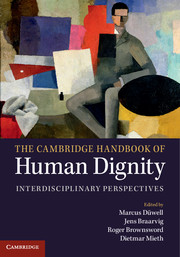Book contents
- Frontmatter
- Contents
- List of contributors
- Foreword
- Why a handbook on human dignity?
- Acknowledgments
- 1 Human dignity from a legal perspective
- 2 Human dignity: concepts, discussions, philosophical perspectives
- Part I Origins of the concept in European history
- Part II Beyond the scope of the European tradition
- Part III Systematic conceptualization
- Part IV Legal implementation
- Part V Conflicts and violence
- Part VI Contexts of justice
- Part VII Biology and bioethics
- 57 The threefold challenge of Darwinism to an ethics of human dignity
- 58 On the border of life and death: human dignity and bioethics
- 59 Human dignity and commodification in bioethics
- 60 Dignity only for humans? A controversy
- 61 Dignity only for humans? On the dignity and inherent value of non-human beings
- 62 Human dignity and future generations
- Appendix 1 Further reading
- Appendix 2 Universal Declaration of Human Rights
- Index
- References
61 - Dignity only for humans? On the dignity and inherent value of non-human beings
from Part VII - Biology and bioethics
Published online by Cambridge University Press: 05 March 2015
- Frontmatter
- Contents
- List of contributors
- Foreword
- Why a handbook on human dignity?
- Acknowledgments
- 1 Human dignity from a legal perspective
- 2 Human dignity: concepts, discussions, philosophical perspectives
- Part I Origins of the concept in European history
- Part II Beyond the scope of the European tradition
- Part III Systematic conceptualization
- Part IV Legal implementation
- Part V Conflicts and violence
- Part VI Contexts of justice
- Part VII Biology and bioethics
- 57 The threefold challenge of Darwinism to an ethics of human dignity
- 58 On the border of life and death: human dignity and bioethics
- 59 Human dignity and commodification in bioethics
- 60 Dignity only for humans? A controversy
- 61 Dignity only for humans? On the dignity and inherent value of non-human beings
- 62 Human dignity and future generations
- Appendix 1 Further reading
- Appendix 2 Universal Declaration of Human Rights
- Index
- References
Summary
In 1992, an article was incorporated by referendum in the Swiss Constitution mandating that the federal government regulations on the use of genetic material should take into account the dignity of non-human beings. Paragraph 1 of the article states:
The federal government shall issue regulations on the use of the genetic material of animals, plants, and other organisms. It thereby shall take into account, the dignity of non-human beings [‘die Würde der Kreatur’] as well as the safety of human beings, animals, and the environment, and shall protect the genetic diversity of animal and plant species.
According to the legal interpretation, the dignity of non-human beings pertains to all individual organisms, animals, plants and micro-organisms. What is meant by the dignity of non-human beings? How does it relate to human dignity? And why should we ascribe it to all non-human beings? If animals had dignity, their moral status might be the same or at least close to the one humans have. They might have, provided that dignity is the basis of human rights, the same rights humans have. On the other hand, if they do not have dignity, the rights humans have might trump the claims that could be made on behalf of animals.
Non-human and human dignity
One might argue that the dignity of non-human beings is just an extension of the concept of human dignity. What we ascribe to humans when we talk of their dignity is also something that should be ascribed to non-humans. Of course, the meaning of the concept of human dignity is contested. But, one could argue, whatever turns out to be the proper understanding of human dignity, it should also be ascribed to non-humans. But why should we do this? Advocates of the view that we should extend dignity to all living organisms give two reasons: first, humans would not have the properties due to which they have dignity if there were no other living organisms. Dignity pertains also to the necessary conditions of the properties which convey dignity to humans. Second, Living organisms have their own teleonomic structure, they are beings that pursue their own ends.
- Type
- Chapter
- Information
- The Cambridge Handbook of Human DignityInterdisciplinary Perspectives, pp. 546 - 550Publisher: Cambridge University PressPrint publication year: 2014
References
- 5
- Cited by



